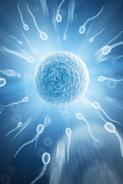
You don't have to be a health food nut to know antioxidants are big news. We seem to hear every other week about yet another study supporting antioxidant's powerful anti-aging, anti-cancer effects.
But I was surprised by the results of a new study. It suggests, at least in lab mice, that antioxidants could disrupt a woman's ovulation and ability to get pregnant.
When a woman ovulates, the brain releases a hormone signaling the follicles in her ovaries to start maturing eggs. The follicles are where eggs are stored while they grow. As the eggs mature, they release estrogen which, when built up, brings on a big surge of luteinizing hormone that signals follicles to release an egg.
Researchers in the study wanted to see if antioxidants disrupted this process. So, they applied antioxidants to the ovaries of female mice and compared them to untreated mice. The follicles of the antioxidant treated mice released far fewer eggs.
To further test antioxidants' effect on ovulation, researchers asked whether luteinizing hormone induced the production of reactive oxygen species, otherwise known as free radicals. Since free radicals are purported disease promoters, more people are taking antioxidants to neutralize them.
So, if women trying to get pregnant are taking antioxidants, could the chemical be neutralizing the free radicals women need to conceive? To help answer this question, researchers treated one group of mice with luteinizing hormone and another group with hydrogen peroxide, a free radical.
The test showed hydrogen peroxide mimicked the effect of the ovulation-inducing hormone. This confirms first, that luteinizing hormone induces production of free radicals, and second, at least in mice, that free radicals are needed for ovulation to take place.
It's a fascinating study and raises interesting questions about antioxidants' potential as a birth control and if a link is proven, could provide vital information for women trying to conceive.
More Information
Antioxidants Might Cause Fertility Problems in Females, Scientists Discover
ScienceDaily reported on the findings that antioxidants might cause fertility problems in females. More
The total antioxidant content of more than 3100 foods, beverages, spices, herbs and supplements used worldwide
An article written by lead scientist Monica Carlsen in 2010 entitled "The total antioxidant content of more than 3100 foods, beverages,
spices, herbs and supplements used worldwide" in the Nutrition Journal volume 9 page 3 is a tremendous resource. Their extensive analysis of the antioxidants present in various foods and beverages can be very informative. More
Red wine consumption increases antioxidant status and decreases oxidative stress in the circulation of both young and old humans
Michelle Micallef is lead author on a scientific paper entitled "Red Wine Consumption Increases Antioxidant Status and
Decreases Oxidative Stress in the Cirulcation of Both Young and Old Humans." in the Nutrition Journal volyme 6 page 27 in 2007. They concluded that red wine consumption decreases oxidative stress and enhances total antioxidant capacity in the circulation.
This data suggests that red wine may have potent antioxidant properties that could potentially protect from developing cardiovascular disease. More
Questioning the Safety of Certain 'Healthful' Plant-Based Antioxidants
ScienceDaily also reports on findings that certain plant-based antioxidants may aggrevated certain types of cancers. More